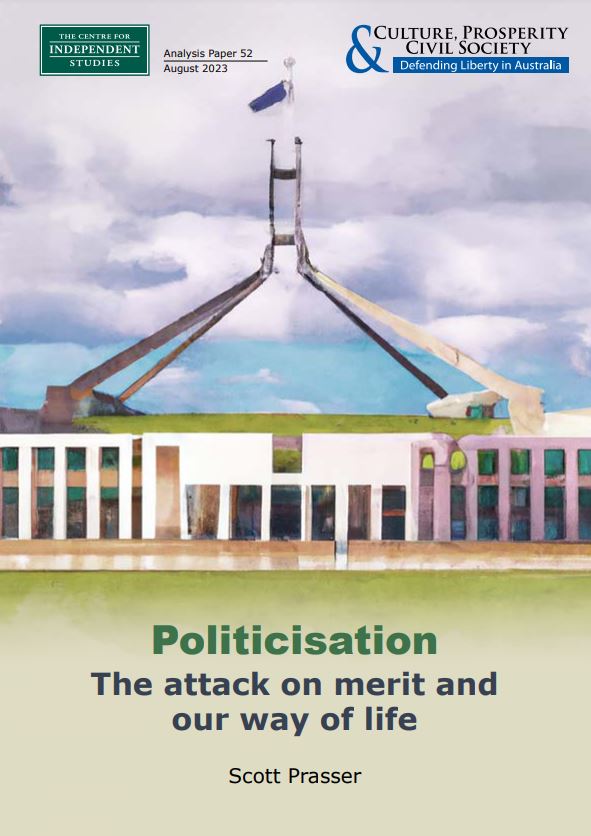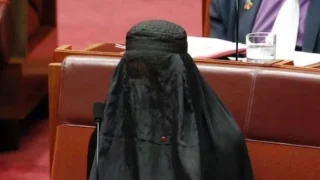
Introduction
This paper examines the issue of ‘politicisation’ of our public services and other public institutions.
The meanings and permutations of ‘politicisation’ are identified, its causes and both positive and negative impacts considered.
It asks whether ‘politicisation’ is undermining the integrity of our institutions, the functioning of our democracy and the core principle of merit – which many regard as the cornerstone of a progressive, modern, western liberal, industrial, and fair society.
It considers whether claims of ‘politicisation’ have been exaggerated and misinterpreted as trends and changes to our system of governance, that many see as necessary.
It proposes some practical suggestions to minimise the worst aspects of ‘politicisation’.
Why a concern?
Complaints about ‘politicisation’ in public appointments are not new, but until recently were largely thought to have been addressed in most Westminster type democracies like Australia, especially at the national level.
While concerns about increasing levels and forms of ‘politicisation’ have been growing for some time, several recent events and scandals have put ‘politicisation’ back on the agenda as a serious issue to be addressed, and has prompted this review.
One recent example was the new Labor Albanese government’s announcement in December 2022 that the Administrative Appeals Tribunal (AAT) would be abolished and replaced by a new body. The Albanese government believed it was riddled with “political appointments” made by the former Coalition government.[1]
At the state level the NSW Coalition government’s attempt to appoint retired National Party leader and one time Deputy Premier, John Barilaro, to a lucrative overseas post was assessed by an independent review (Head Review) as having “brought the integrity of Public Service recruitment processes into some disrepute”[2] and undermined the traditions of an independent, merit based public service as developed from the 19th Century British Northcote-Trevelyan Report.
In Victoria, media allegations about appointments to a host of public service positions by the Andrews Labor government[3] prompted the Legislative Council to require the Victorian Ombudsman “to investigate some matters, including issues relating to the alleged politicisation of the public service”.[4] That review is currently being conducted by former Commonwealth Ombudsman and Australian National University Emeritus Law Professor, John McMillan. Adding to those concerns have been further complaints that retired Labor ministers like James Merlino have been appointed to positions with State authorities..[5]
In Queensland, the 1989 Fitzgerald Commission of Inquiry sought to set new standards in integrity. Numerous new institutional arrangements followed including establishing Australia’s second anti-corruption body, the then Criminal Justice Commission.[6] Nonetheless, issues of integrity and politicisation have plagued successive Labor and Coalition administrations. During the last twelve months there have been three major commissions of inquiry into scandals concerning the Palaszczuk Labor government.[7] Little, it seems, has really changed in Queensland’s ‘winner takes all’ political culture.[8]
Federally, the recent report by the Grattan Institute assessed that “across all federal government appointees, 7 per cent have a direct political connection and this figure rises to 21 per cent among those positions that are well paid, prestigious and powerful”.[9] The Grattan Report concluded that similar problems existed across state governments.
The 2019 review of the Australian Public Service, the Thodey Review, acknowledged it was “aware of claims that, at times, the appointment of secretaries (departmental) reflects political patronage and does not follow due process – that who you know can be more important than what you can do” and could lead to a “loss of trust by the public and fear among public servants”.[10] However, it made no recommendations to remedy the situation,
The election of a new Albanese government in 2022 has seen sackings of some senior departmental secretaries and new appointments to key portfolios and pivotal bodies like the Reserve Bank of Australia (RBA), the Productivity Commission, and the Fair Work Australia. While not new, this reminds us once again how such appointments remain the sole prerogative of executive government with little external oversight and how Australia has moved from the Westminster model to the now ‘Washminster’ system.[11] That a number of these appointments are seen to be for those closely politically tied to the new government has raised complaints of politicisation[12] and “stacking.”[13]
Another form of politicisation surfaced during the pandemic (2020-22) with concerns that advice from key government agencies and senior staff in Australia was too tailored to meet political exigencies rather than to provide the full range of available scientific evidence including that which did not conform to then current government preferred actions.[14]
These concerns about politicisation of the public service have extended in recent years to complaints about appointments to the judiciary[15] and calls for a more transparent process[16] including a formal independent advisory body to draft nominations for governments to consider.[17] An Australian Law Reform Commission’s (ALRC) report recommended that the Commonwealth “adopt a more transparent process for appointing federal judicial officers”.[18] That a major appointment is soon to be made concerning the Chief Justice of the High Court again brings this issue into focus.[19]
Most recently, the Royal Commission into the Robodebt Scheme (RCRS) reignited concerns about politicisation of the Australian Public Service (APS) as it heard evidence about “APS leaders (both Secretaries and SES leaders) being excessively responsive to government, undermining the concept of impartiality and frank and fearless advice”.[20] Andrew Podger’s report for the RCRS summed it up thus:
… over the last 35 years, there has been a significant shift towards closer Government control … These concerns include whether it has led to excessive responsiveness by APS leaders (both Secretaries and the SES…) to the wishes of ministers, undermining ‘frank and fearless’ advice … public confidence …(and) contributed to a loss of capability in the APS. [21]
Together, these trends confirm Professor John Halligan’s argument that:
The politicisation of public services has been a relentless trend in public administration internationally … Politicising tendencies over time point to a long-term trend … incremental politicisation is ingrained.[22]
Halligan believes such trends are not peculiar to Australia and are evident across all western democracies, including those countries once thought immune or only lightly politicised, and has been intensifying more in places previously prevalent. His argument has been that in Australia, “politicalisation has extended to greater influence over appointments of top officials and more intense pressures exerted by political leaders on how senior officials operate”[23] than elsewhere.
Journalist Paul Kelly too has contended some time ago that the “system of governance (in Australia) is becoming more politicised. Indeed, it can be argued that our very society and culture are becoming more politicised”.[24]
Five issues emerge from these developments that are addressed in this paper:
- What is meant by ‘politicisation’ and ‘merit’ and what are their various permutations?
- What has changed from the past, if anything?
- What are the drivers for increasing politicisation?
- What are the possible adverse impacts?
- Can anything be done to ameliorate these adverse effects of ‘politicisation’?
Defining ‘politicisation’ and ‘merit’
Professor Richard Mulgan acknowledged that “politicisation … is an imprecise concept and needs to be carefully defined”.[25] This makes accusations of its occurrence easy to deflect, especially given the multiple agendas in modern government in relation to personnel practices concerning equity and representativeness issues.
Table 1: Types of politicisation in government[26]
-
- Making senior appointments based on partisanship, personal relationships, loyalty;
- Political patronage — rewarding personal and political loyalty in appointments to government advisory boards and committees;
- Allocating public finds for political advantage;
- Public servants’ direct political involvement in campaigning and party activity;
- Appointments of those politically aligned but based on merit selection criteria (“meritorious mates”);
- Appointments on grounds of equity or ‘representativeness’ in addition to/or even instead of narrow position ‘merit’ criteria;
- Public servants serving in ‘political’ roles in developing policy (as distinct from sharing work with ministers);
- Development of a ‘responsive’ public service through contractual employment (giving ministers what they want as distinct from what they need);
- Expansion of ministerial roles and offices into more and more areas of administration through expansion of ministers’ offices and powers to oversee and supplant public service functions (giving directions, preparation of cabinet submissions, co-ordination).
Table 1 identifies ‘politicisation’ found in government from the most blatant involving overt partisan or personal appointments, to those reflecting certain forms of patronage sometimes reflecting certain backgrounds and affiliations (e.g., trade union and business), to those who might be more philosophically aligned, loosely connected and policy committed than just partisan lackeys.
Appointed through formal selection processes involving little direct apparent political interference they usually have relevant qualifications and experience that fit the position description, and thus are harder to identify as ‘political’ appointments and hence have been dubbed as “meritorious mates”.[27] Such appointments over time can lead to the subtle colouring of a department’s policy culture so that only a certain range of views are accepted.
Another more overt form of politicisation occurs when administrative decisions are made to advance the partisan interests of the government rather than the wider public interest. This includes when over-compliant public servants seek to please the current government by waiving rules concerning some program that they know is for partisan advantage.
It is argued that the longer a government is in office – and appears it will remain in power – the greater will be the propensity of the public service to comply. In other cases, ministers may use their authority and discretionary powers to override program criteria for a perceived political advantage. This would include grants to particular electorates, fast-tracking approvals, or supporting sub-optimal projects. This is seen by some as ‘pork-barrelling’ defined as “corrupt” in some jurisdictions.[28] Others see it as just ‘politics,’ responding to democratic pressures involving necessary compromise and negotiations to progress certain policies without which would “render the modern practice of government unworkable”.[29]
Halligan believes that ‘politicalisation’ is not a single activity, but a combination of behaviours and institutional trends culminating in “the expansion of the influence and control of the political executive within the executive branch”.[30]
This goes beyond just making the occasional partisan appointment, minor political tinkering concerning some administrative process, or even giving preferment to some interest group. Rather, it is about how power and decision making on an increasing range of areas have shifted decisively from the administrative state to the political office, where partisan considerations are paramount.
It means political actors subsuming many of the roles once performed largely by the permanent public service. This shift has been aided and abetted by both deliberate partisan motivated institutional changes over matters like senior appointments and other developments in public sector management known as New Public Management (NPM) that has justified the loosening of previous controls and convention as is discussed later.
Another form of ‘politicisation’ listed in Table 1, though one rarely classified as such, concerns making public appointments based on equity or ‘representativeness’ rather than specific criteria pertaining to ‘merit’ or skills required to perform the tasks of designated positions. Sometimes, there will be a needed congruence between the two such as ensuring staff have both the requisite skills and experience as well as certain characteristics to deliver programs to certain groups.[31] What might be the consequences of the Albanese government’s Review of Public Sector Board Appointments Processes to consider not just “appropriate standards for the processes by which Board members are appointed” but also about “improving the diversity of board membership … in terms of gender, CALD, First Nations and geographic representation”?[32]
Similarly, issues surface from time to time in relation as to whether lowering entry criteria into university courses like teacher education, to improve access for lower-socio economic students or to maintain university enrolments is another form of politicisation.[33] Recent announcements by the current Federal Education Minister following another teacher education review to improve initial teacher education reflects some of these concerns.[34]
Another area of ‘politicisation’ though hard to define, is when institutions and the type of expert advice they provide becomes captured by certain ideological frameworks, so that advice is framed before data is collected let alone analysed. This undermines the rationalist, instrumentalist view of policy development of collecting and assessing evidence in providing policy advice. Instead, institutions are selective in their focus, and alternative or contrary views deflected, or even suppressed. As Stromsdorfer summed up, “Canons of scientific advice are not ignored but are applied selectively”.[35] While this phenomenon is not new[36] the complaint is it is becoming worse, caused by increasing societal polarisation, and social media that gives too easy access to information of questionable rigour. Consequently, selective opinion-driven information gets paraded as the latest ‘truth’, leading ’ wilful ignorance’ and becoming a ’malicious partisan’ actively blocking alternative views.[37] Examples emerged during the pandemic, when some experts believed certain well founded scientific evidence concerning COVID-19 was, “rejected in favour of beliefs that have become dogma without a firm evidence base”.[38]
Creation of an apolitical based public service and merit-based society — the ‘good old days’?
Before examining current arrangements and assessing the level of ‘politicalisation’ it is important to appreciate from whence we have come – indeed was there ever an apolitical public service providing ‘frank and fearless advice’ as so often proclaimed? Were the ‘good old days’ really that good?[39]
Certainly, historically, most Western governments and their administrative systems, including Britain’s, were until the latter half of the 19th Century with a few exceptions,[40] highly ‘politicised’ and often ‘corrupt’. There was little distinction between executive government and the public administrators who did its bidding. Offices of state were sold or leased by the crown to raise funds or, through patronage, provided paid places for friends, relatives (nepotism) and lackeys.
Many were sinecures, requiring minimum or no effort. Where duties were required to be performed, they were often done poorly. Retaining positions was largely dependent on loyalty and obedience to those in authority rather than competence in performance. Nevertheless, those with ability, were often needed and found – battles had to be won, taxes collected, revolts suppressed, and buildings built. Certainly, some were chosen for senior posts because of their recognised abilities and were even from humble backgrounds.[41] The trouble was it was a hit-and- miss affair lacking consistency, predictability, clear selection criteria and was dependent on the judgement of the ruler.
In Britain during the 19th Century major reform of government administration was driven by a variety of factors. There were the regulatory demands of a more complex industrialised economy. The reform of parliament and the extension of voting rights to the growing middle class resulted in their demands for a greater say in how their taxes were spent, and outcries over sinecures and incompetence, like the costly military blunders of the Crimean War (1853-6).[42] Fear of revolution drove the need for improved welfare services. One major response was the Northcote-Trevelyan Report in 1854-55.[43] It proposed a politically neutral public service able to serve whatever government was elected and whose members were appointed by merit selection processes like competitive entry exams and specified education qualifications or standards. These proposals were implemented over the following two decades. The result was a civil service that was seen as the “first true meritocracy, a genuine aristocracy of talent.[44] Of course, it did owe a lot to the Indian Civil Service that preceded it and to the much earlier Chinese Imperial bureaucracy.[45] Similar reforms occurred in the United States, though later.[46]
This model found its way to Britain’s colonies like Australia, though not immediately. Indeed, Australian colonial public services were initially noted for their patronage, featherbedding, corruption and inefficiencies.[47] It was only following a series of royal commissions across most of the colonies that public service reforms on the Westminster model were gradually adopted.[48] This was to extend to the new Commonwealth Public Service established under the all-encompassing Commonwealth Public Service Act 1902. It embodied the Westminster model though with certain variations like statutory based public service boards to manage staff recruitment and personnel matters.[49]
Public servants were permanent officers, holding positions for long periods. Their senior members came to be highly regarded and independent from political manipulation.[50] The merit principle was mentioned in the Public Service Act 1922 (Cth) and received more specific definition in subsequent legislation (Public Service Act 1999 Cth, c3(a)). As Wiltshire summed up: “great pains were taken to remove any hint of interference with recruitment and promotion of public servants”.[51] Efforts were made to ensure the public service “should be in the position to provide fearless and impartial advice to the government of the day”.[52] The public service was portrayed as being neutral, apolitical, corrupt free, and largely efficient. It provided ‘frank and fearless’ advice to elected officials and the administrative capabilities to implement government policies.
These developments in government were accompanied by reforms in the professions. Standards were set for attaining of professional status and being able to practice. External exams and tests became mandatory for entry into education institutions regardless of social background. These changes were gradual but relentless. They were the cornerstones of ‘merit’ allowing for its testing and measurement.[53] The wealthy had greater access to certain education institutions, but scholarships for the less privileged became wider and wider. These trends accelerated with never-ending industrialisation and the demands of two world wars that involved mass mobilisation.[54]
The road from Westminster to ‘Washminster’ and increasing politicisation
Nevertheless, the Westminster ideal was not without its flaws and critics.
Flaws in Westminster
In Britain, the Civil Service, despite its achievements and lack of corruption, was increasingly seen to be drawn from too narrow a social class and education background. For some, it was just an extension of ‘the establishment’ and thus conservative and inflexible. Nor was Civil Service even apolitical as its members were from the same social class as senior members of governments. It was a myth that the British Civil Service was politically neutral as it merely “served the purposes of the ruling elite”.[55] During the 1960s the Labour appointed Fulton Committee of Inquiry (1968)[56] highlighted the Civil Service’s narrow recruitment base, poor management skills and questionable policy capacities. These problems were linked to Britain’s economic decline becoming evident at the time and the perceived failure of other key institutions[57]. Labour governments also believed their ‘reformist’ agenda was being obstructed by an unsympathetic Civil Service and sought to exercise increased control.[58]
Conservative governments, when they returned to office under Thatcher in 1979 wanted more control over the Civil Service too, but for different reasons than Labour. Their concern was that government had become too big, overloaded and its spending out of control. That the Civil Service was considered as a major beneficiary of such state expansion meant it would thwart their policies unless more direct political control was exerted.[59] Thatcher responded by broad macro-economic strategies and cuts in spending (monetarism), rejection of Keynesian economics and consensus politics, privatisation of large chunks of the public sector, competitive ‘markets’ for public goods, and reduced industry subsidies.[60] It was matched by centralised control from the prime minister’s increasingly court-like office with its ’fortress culture’ and its ’Is he one of us?’ culture.[61] Increased prime ministerial control continued apace under the Blair-Brown Labour governments (1997-2010).
Deviations in Australia
In Australia, after federation the merit principle was early partially diluted by the influx into the public service of returned servicemen from the two world wars.[62] Seniority often dominated promotions, especially at the state level, and graduate recruitment was limited. By the early 1970s there were concerns that senior Commonwealth officials came from a too narrow social, educational and gender background.[63]
Long periods of incumbency by federal and state governments aroused suspicion that the public service had become ‘politicised’ and would be obstructive to new administrations. The lack of major external public reviews across all jurisdictions till the 1970s, made the public services appear out of date and unrepresentative of Australia’s changing society. This criticism ignored their achievements of effective service delivery across an increasing array of areas under sometimes trying conditions of world wars, an international pandemic, economic depression, and a post Second World War reconstruction, the massive immigration program, and global financial restructuring.
The watershed in Australian public administration that changed its structure and began the trend to what some saw as increased ‘politicisation’ was the election of the federal Whitlam Labor government (1972-75). Coming to office after 23 years in opposition, Labor was naturally suspicious of the loyalty, commitment and capabilities of the Commonwealth Public Service (CPA) it had inherited to implement its massive policy program for social change, institutional renovation, constitutional alteration, and increased national government intervention and spending.[64]
Labor wanted the public service to be “responsive” to its mandated agenda. There was a view within the Whitlam Administration, promoted by Whitlam’s personal staff like Peter Wilenski, Jim Spigelman, John Menadue, the ministry, and across the Labor Party, that the CPA was not to be trusted, that the Westminster principles on which it was based concerning political neutrality, career service structure and permanent tenure were out of date, not reflective of the realities of modern democracy and more particularly, the demands of a ‘reform’ government. Wilenski was scathing of the need for permanent tenure as the basis of providing fearless policy advice describing it as a “very facile assumption”.[65] Spigelman also proclaimed, “There was no such thing as a politically neutral service”[66] while Menadue later derided notions of a neutral public service after 23 years of non-Labor governments.[67] As one senior Whitlam minister said, “We need the guerrilla fighters, the people who want to change society. I don’t know whether you would find them in the public service”.[68]
The Whitlam government inaugurated a new era of increased political intervention and restructuring of a once stable public service.[69] Greater political control was sought by more lateral recruitment into the upper ranks of the public service that had previously been limited. Three of Whitlam’s personal staff were appointed as department secretaries which marked this new approach.[70]
Ministerial control and the beginning of the transfer of power to the minister’s office began with the expanded ministerial staff, now personally selected by ministers mainly from outside the public service. Some were expert but many were partisan sympathisers or in some cases, even family members.[71] While the Coalition Opposition and others saw these trends as undermining the traditional principles of a neutral, career, merit based public service, its key architects like Wilenski argued they were not ‘politicisation’ but rather represented the “restoration of ministerial responsibility” and ensuring “popular control over public policy”.[72]
Subsequent federal and state governments learnt from the Whitlam experience. The Fraser Coalition government (1975-83) built on many of Whitlam’s legacies in terms of maintaining tight control over the bureaucracy especially from the prime minister’s office (PMO) and Department of Prime Minister and Cabinet (DPMC) .[73]
The Hawke government came to office determined to avoid Whitlam’s economic mismanagement and with clear plans to manage the public service more effectively.[74] Wilenski returned, first as a departmental secretary and then as chair of the Public Service Board (PSB) to oversee departmental restructurings, appointments and the abolition of the PSB in 1987.
Together, these developments were seen as an “assault on the conservative bureaucratic citadel with the overriding instrument of legislation, as well as executive directives”.[75] The abolition of the powerful PSB and its replacement by the less powerful Public Service Commission marked the end of centralised personnel controls and constraints on executive government power concerning the public service. As noted, this had been seen as a contributing factor to the Robodebt scandal.
From 1994, provision was made for fixed term appointments for departmental secretaries — permanency, already on the wane, was out, contracts were in, as was greater lateral recruitment.[76] Ministerial staff numbers continued to grow and with the passing of the Members of Parliament (Staff) Act 1984 such staff were now employed directly by members and ministers outside of usual public service employment.
Matters accelerated under the Howard government (1996-2007). Some 40 per cent of its inherited departmental secretaries were quickly sacked. Department secretaries were also removed on grounds of ‘incompatibility’ with their minister.[77] Some were moved into different roles with little notice or choice.[78] Such trends have continued since. The ‘Washminster’ system has truly arrived and as noted earlier, we are witnessing it again with the new Albanese government and the consequential senior personnel changes. This is now accepted practice. Paul Kelly’s earlier observation rings true:
… both sides know they need their own highly qualified boys in senior positions to ensure that the will of ministers prevails and is put into practice. There is a strong bipartisan feeling that the balance of power must be shifted towards ministers from the senior career public servants.[79]
Concomitant with these political drivers promoting increased political control and seeking a greater public service responsiveness was the New Public Management (NPM) or the “new managerialism” that emerged in the 1980s. It emphasised private sector management techniques, performance pay, lateral recruitment and contracts for senior staff, the ending of permanency, outsourcing, and a managerially focussed and mobile Senior Executive Service (SES) .[80]
NPM may have arisen out of economic pressures and the need for the public sector to have modern management skills, but it also played a major part in providing the tools and justifications for increased political control over the public sector as it allowed “considerable latitude for the use of partisan and ascriptive criteria in hiring public officials” and a host of other previously unprecedented political interventions in administration.[81]
An additional driver for increased political control internationally[82] and in Australia[83] has been the changing environment in which governments now have to operate. This includes: 24/7 media cycle; monitoring of every political utterance; the expansion of social media; demand for instant answers from governments; expectations concerning election promises; amplification of every issue to ‘crisis’ proportions; proliferation of new external review bodies like anti-corruption agencies; explosion of interest groups and think tanks; political volatility with declining support for major parties and the emergence of minor parties, independents and populist groups[84] sometimes holding the balance of power.[85]
Politics has become continuous, unrelenting, campaigning. Consequently, governments appreciate their very survival depends on having their hands on all the levers of power including the public bureaucracy to be able to exercise greater control to cover any contingency and to minimise adverse coverage and reaction. Having a politically loyal and committed staff throughout government, not just in political offices, that is always adhering to the government’s lines, and being politically alert, is essential for a government’s survival. Such support, “goes beyond the traditional requirement of loyalty to the government of the day. It substitutes partisan loyalty for impartial loyalty”.[86] The aforementioned appointment of trusted “meritorious mates” along with greater centralisation of power within executive government to control policy and media management are the essential mechanisms of political control. These developments have been labelled the New Political Governance (NPG).[87] As Stewart summed up:
The consensus … is that the effect of these changes was to centralise and entrench political power relative to the public service … one could argue there has been a palpable shift in the culture of political power in Australia since the mid-1980s, with the role of politics and of politicians highlighted as never before.[88]
This is, in effect, what the RCRS found, and which Podger, in his report to the commission identified, as highlighted earlier. These developments did not originate with the Coalition administration from 2013-2022, or the Morrison government. Rather its particular characteristics exacerbated long running trends of increased political control. The music stopped just long enough, thanks to the RCRS, like so many royal commissions have done concerning corruption and maladministration[89], for us all to see what has been happening – what modern Australian government has become.
Impacts of increasing ‘politicisation’
Assessing the impacts of politicisation depends on how it is perceived in the first place. For some, there can be positive arguments in favour.
Mulgan, for instance, suggests that the “consequent increase in responsiveness is not necessarily to be deplored. To some extent, it may reflect a laudable increase in democratic control of the public service”.[90] After all, having a more responsive public service, is merely restoring existing constitutional arrangements of ministerial responsibility. Former Hawke government departmental secretary, Vince Fitzgerald, put it this way:
Through these reforms, ministers were re-established in practice in the position that they always had constitutionally[91], namely, being effectively in command of the departments which they administer. They have become more readily able to hire and fire their department heads and more effectively able to direct their departments in both administration and policy development.[92]
Such views reflect then Federal Labor Treasurer, Paul Keating’s argument when berating the former Liberal governments and ministers about how “they never ran the policy – they never ran the place… We run this place. We run departments. We run the policy. We comprehend. We know”.[93] Whether unrestrained government is always desirable is another issue and it is this issue that lies at the heart of the complaints about the Morrison government[94] and which has received further exposure by RCRS as discussed.
Certainly, greater political control has support, as we have seen, across the political divide. Appointing those in empathy with a government’s agenda makes good administrative and political sense. It reduces friction between elected government and officials, contributes to the smooth implementation of government policy and reduces possible obstruction – some of which may need to be overcome for sound policy reasons. Sir John Hoskyns, head of Prime Minister Thatcher’s policy unit advocated outsiders to a variety of public service positions as they would be committed to the government’s cause.[95] Having such “meritorious mates” is quite different from the old patronage model where skills and expertise were often missing.
Wilenski, and others of his ilk, went further. They saw these developments as not just restoring democratic and ministerial control over government administration or even bringing in outside expertise. Rather, it was more about ensuring, even stacking, the senior ranks who shared the ideals to support “the direction of social democracy”[96] in all its aspects. Thus, he argued “for an overwhelming case for government itself to have the right to appoint directly both departmental heads and a proportion of other senior appointments” across the public service.[97]
Nevertheless, problems abound. Foremost of these, is that appointing those with the same ideological outlook combined with limited tenure creates a form of ‘groupthink’[98] and conformity in providing policy advice and developing policy. This is reinforced by the fact that political and partisan power when exercised in hierarchical structured organisations like the public service, is followed with little resistance. That is the nature of such organisations. It has been reinforced within portfolios by the rise of ministerial offices, and across government, as Stewart and others have highlighted, by centralising trends and their agencies like the DPMC and PMO. Such trends stifle critical advice, alternative views and have been seen as contributing to policy fiascos and administrative failures[99] of which the Robodebt scandal is but one more example.
Then there is the over-responsive public service issue. Weller pointed out in relation to the ‘Certain Maritime Incident’ during the Howard government that “as public service careers begin to rely more and more on the good favours of ministers, departmental secretaries can become too responsive to show they are on board, too concerned with political protection”.[100] They are “not sufficiently sceptical and alert to warn”.[101] The Robodebt scandal is a more recent reiteration of this problem where some public service concerns about legality and effectiveness of the scheme were not fully and openly communicated to ministers because of senior management’s over- responsiveness to government agendas. This reflected long running trends. Consequently, argues Banks, public servants no longer work in an environment where they can “speak truth to power”[102] and as contracted staff, they increasingly serve the ole of the medieval courtier” than independent policy advisers.[103]
Moreover, the loss of permanency and the introduction of the contract system for departmental secretaries and SES officers has produced other adverse impacts. It has led, for instance, to the inevitable cycle of staff changes, sackings and departmental restructurings with every new administration. This has become more evident in recent years. Again, it is not peculiar just to federal government. It is now the practice across all Australian jurisdictions. Modern government, it has been argued, worships at the “idolatry of ceaseless change and modernization”.[104] It results in considerable administrative instability, organisational amnesia and a loss of policy continuity, knowledge, and experience of what works.[105] While this was once a complaint of elected politicians and their staff, it now applies to the contracted senior levels of the public bureaucracy which is no longer doing what it used to be noted for – keeping records, appreciating policy history, and following due process.[106] Wheeler once compared the distinctions between a permanent bureaucracy and elected officials:
At the policy advising level the professional career service provides a systematic input of past experience and current analysis at a level of quality which just cannot be obtained by any other means … It is, I believe, in the nature of politics that there have been, and will be, fluctuations in the level of ministerial skill in the handling of the career service in its use to maximum advantage…[107]
Another flaw is the SES contract staff model with its emphasis on transferable general management skills that can be applied across any agency and policy area regardless of specific content knowledge and experience. It is seen as a contributing factor to the decline in both public service policy[108] and technical[109] capabilities. It is further testified by the extensive resort to outside consultants for policy advice and service delivery.[110] Lateral recruitment of many SES, while offering benefits, raises other concerns. A feature of the career service was that public servants worked their way up the hierarchy, served in a variety of roles, and gained knowledge, skills and experience about how their department worked. By contrast, lateral senior recruits start at the top. Their direct experience of the department’s different functions is limited. Interestingly, this was another problem identified by the RCRS resulting in several recommendations including that “SES staff … should spend some time in a front-line service delivery role”.[111]
All these trends, the repeated exposures by anti-corruption bodies and royal commissions concerning jobs for the partisan “boys and girls”, questionable policy processes, misallocation of funding, and waste, have been a further contributor to the decline in the public’s trust in government. Most concerning, this loss of faith is no longer just in elected officials where perhaps it has long been in short supply. Rather, that it now extends to the public service, and most worryingly to the Australian Public Service once seen as a model of competence and integrity.[112] This is another factor making the building of public consensus for policy reform and implementation so much harder to achieve.[113]
Already discussed in relation to the pandemic is how alternative expert advice was suffocated by an all too compliant politically loyal public service. The Victorian Board of Inquiry into the Hotel Quarantine scheme showed how senior public servants were willing to shield their political masters from taking responsibility for such scandals. Such behaviour, said Banks, was “a crisis in the bureaucracy itself”.[114] The Shergold Review of the pandemic assessed that “political calculation was never far from the surface of COVID-19 decisions” and that there was often an absence of evidence for decisions often made in the name of ‘expert’ advice. [115] The result were policies that were ineffective, caused unnecessary closures of schools and business, much stress, and a loss of faith in government decision making[116] as well as a misallocation of resources.[117]
To reiterate, the RCRS highlighted many of these negative traits: the too easy acceptance and adoption of income averaging technology as a policy option; lack of checking in the policy development process of key elements like its very legality; an over-willingness of senior departmental staff to comply and consort with their political leaders to mislead cabinet and undermine other colleagues; the unwillingness of public service officers at all levels to question the legality, cost, and impact of the scheme; and the way the policy problem was defined in relation to welfare recipients and welfare benefits.
Looking for remedies
Are there any remedies to these complaints or is the ‘politicisation’ genie out of the bottle and cannot be returned?
Inevitably, when problems emerge the response is to increase regulation, change laws and to create new institutions. Corruption scandals during the 1980s and 1990s resulted in new costly anti-corruption bodies and a vast array of ‘integrity’ mechanisms. Their effectiveness, injected as they often are into the same political environment that spawned the problems, however, as discussed, has often been found wanting.[118] So, care needs to be taken in expecting new institutional arrangements, laws and regulations to have long term success.
The Grattan Institute’s proposals to address ‘politicisation’ concerning appointments to advisory bodies and boards, has opted for new institutional arrangements and legislative enforcement approach. It made three major recommendations:
- that all appointments to boards, tribunals and statutory bodies be advertised with clear selection criteria;
- establishment of an independent panel with a new Public Appointments Commissioner to assess applicants and make a shortlist of nominations;
- Limit ministerial discretion to choosing only from the shortlist with annual reporting to parliament on compliance;
- Report annually to Parliament. [119]
This is largely adopted from the UK where such arrangements have operated since 1995 and work under a Governance Code for Public Appointments with a Commissioner for Public Appointments and special panels across departments to nominate ‘preferred’ members for a wide variety of positions. There is a further parliamentary committee to oversee these processes. Although ministers can override recommendations this courts controversy and further reviews. An independent review found these arrangements bureaucratic and complex with delays in appointments lasting three months or more.[120]
Other criticisms were the stultifying conformity of those nominated in terms of views and outlooks.[121] Nevertheless, current arrangements largely persist. Administratively, politically, and practically this would be inappropriate for Australia. It would spawn another layer of bureaucracy and legislation, be too slow in a system with three-year terms, obstruct new governments wanting to ‘hit the ground running’ and remove legitimate decision making and discretion from elected governments.
The RCRS, accepted that the Robodebt scandal was driven by the “many failures of public administration” and “failures by members of the APS to discharge their professional obligations”.[122] As stressed in this paper, however, these were not the consequences of one administration but a culmination of many long running trends that had bipartisan support. Many of these were identified in the RCRS’s commissioned report by Podger — an over-responsive public service, lack of independence of departmental secretaries, loss of permanence, weak central personnel powers, intrusive ministerial offices — the key elements of a ‘politicised’ public service.
The RCRS eschewed “recommendations for wholesale reform of the APS” because of its terms of reference, timeframes and resources.[123] Most of the RCRS’s recommendations, as discussed, however, focussed on more limited public administration practices, concerning consultation, training, budget processes, governance practices, record keeping, reporting, and some amendments to existing legislation. It genuflected much to the 2019 Thodey Review which although, as noted, acknowledged problems about patronage in senior appointments, offered limited change from existing arrangements involving joint process of nomination of department secretaries by both the heads of DPMC and the Public Service Commissioner[124] but who nominates them especially when there is a changeover of personnel with a new government? Appeals to the APS’s Codes of Conduct, improved induction systems and “robust” training, better frontline experience, improved monitoring of secretary performances and a code of conduct for ministerial staff, although all having some value, hardly tackles the underlying causes of politicisation.
Any attempt to tackle ‘politicisation’ should directly address those underlying drivers as have been identified. At the same time, returning permanence for senior department staff, curtailing ministerial involvement in their appointments, ending the SES and the contract system, resurrecting the old public service board model of tight centralised personnel management, reducing the number and the roles of ministerial staff, and curtailing prime ministerial centralisation and hegemony, will all be met with resistance by those who would have to implement such changes — politicians and the parties they represent.
Consequently, any proposals for reform need to work with what now exists, not seek to reverse current accepted practices, be neither complex nor costly, and avoid seeking to supplant wholesale reconfiguration if it is to gain essential bipartisan support. It should be centred around parliamentary scrutiny and transparency but accepting of its place in the Westminster system as it operates in Australia, and that executive government has to govern and is expected to do so. It also needs to go beyond the aforementioned so called ‘merit’ selection process of advertisement and panel interview presently being used to justify a number of current new appointments as being ‘apolitical’.
The proposal of this paper, given our decisive shift to the ‘Washminster’ model is to adopt, as Banks also suggests,[125] the checks and balances of the United States (US) Senate confirmation process[126] currently missing in Australia. In the US, presidential nominees for a wide variety of positions, are constitutionally required to appear before a Senate committee, be cross-examined and be formally confirmed before taking up their roles. Although partisanship occurs, as President Trump’s nomination of Judge Amy Coney Barrett to the Supreme Court in 2020 showed, the process makes executive government take care in who is nominated, is transparent, ensures Congressional involvement and oversight and develops some bipartisanship for such positions. Only about 2 per cent of nominations are rejected.
In Australia, such a confirmation process would have to be modified to reflect our parliamentary system. There could be a statutory based joint House of Representatives and Senate committee to examine nominations for a limited number and type of appointments. There are already long serving models of such joint committees, like the Joint Committee of Public Accounts and Audit that has operated since 1951. A recent addition is the Joint Committee on the National Anti-Corruption Commission (NACC) appointed under the National Anti-Corruption Act 2022 (Cth). Its role is to monitor not just the performance of the new NACC, but also to “consider proposed recommendations for the appointment” of the NACC’s Commissioner, Deputy Commissioner and Inspector. Similar parliamentary oversight committees govern the selection of the chairs of the various anti-corruption bodies which operate across the states and territories. They have varying powers. Some are just required to be “consulted” about nominations leaving it unclear what that means in practice. In other jurisdictions committees can veto nominations. Some only review a government’s written submission while others may hold interviews with the nominee, though they are not usually made public. There are strict time limits to respond to nominations.
So, a preferred Commonwealth model could be a joint statutory parliamentary committee with clear criteria to be used for selection connected directly to the tasks to be performed by the position. The range of positions covered should be limited to those in full time roles serving in permanent on-going bodies. It would initially cover departmental secretaries, and certain statutory appointed chairs requiring Governor-General approval.
Appointments to courts, royal commissions, ad hoc non-statutory public inquiries and part time positions on advisory boards, should be exempted. Timeframes for review should be limited to two weeks once a nomination has been received. Hearings should be held in public but be limited to a single day of hearings. The committee can only make a recommendation, not hold veto power. It can only recommend against a nomination on the basis of criteria prescribed in the legislation that pertain directly to the position’s specific capability requirements.
This proposal has some of the elements of the UK model without creating an additional layer of paid bureaucracy and multiple review agencies. It is anchored in parliament’s rather external regulators. It is realistic in terms of the proposed limited breadth of coverage of positions. Although lacking veto powers, its transparency makes it powerful. This ensures executive government and its nominees take it seriously. It also exposes the committee itself to public view so its behaviour can also be assessed, and excessive partisanship exposed. It is cost effective involving current backbenchers and existing parliamentary staff who could be seconded from other committee work for the short periods required. It is not envisaged that the committee is a full-time body with extensive research staff like the Commonwealth Parliamentary Budget Office.[127] As the House of Representatives only sits approximately 60-75 days a year[128] and the Senate a little more, given its estimates committee process, there is time for such a parliamentary committee to do its work without disrupting parliamentary business or the electorate duties of members.
As to how to address the other issue that emerged during the pandemic but occurs in so many other areas of public policy, namely of separating politics from advice so that expert advice is not manipulated and only one course of action is proposed, remains problematic. One might hope universities could fill the gaps, but they were markedly silent during the pandemic concerning some of the absurdities that governments pursued.
Moreover, their orientation seems less and less on the immediate world around them, and they themselves have been charged with various forms of ‘politicisation’[129] that is hard to address.[130] Other suggestions include making key advisory bodies release any minority reports along with the votes by members on important issues. Amore diverse membership based on different expertise would also help.[131] The Shergold Report too, recommended a more multidisciplinary health advisory body to avoid capture by a single perspective and manipulation by government. These would run counter to the other trends identified in this paper and might lead to even more political intervention to produce the desired results. And the diversity issue being played these days is not about a range of views about policy but rather about group identity.
Conclusions
An emerging challenge to good government, liberal democracy and our way of life is the increasing ‘politicisation’ of our system of government. This involves a diminution of genuine merit selection and a narrowing of the range and quality of advice being provided to government and available to the public. It is infecting a wide array of institutions – the public service, the judiciary, the universities and increasingly other community bodies.
Until the breadth and depth of ‘politicisation’ is recognised then it can never be properly addressed. Nor can it be tackled unless there is bipartisan support, but the major parties and those in office have much to lose in any changed current arrangements. But more than this it requires a wider community rethink about the need for genuine open and informed discussion and decision making based on evidence not ideological dispositions whether reflecting views about the role of government or issues of equity and identity.
So, it is perhaps best to accept there is little chance of returning to those ‘good old days’ of an independent and impartial public service, loyally serving the government of the day. The best that may be achieved is to ensure that there is greater transparency and open debate about a limited range of appointments and hopefully, if reported correctly, let the public decide about their appropriateness. If successful, this practice might ensure we get some of the people the nation deserves and needs.
References
[1] Dreyfus M., MP, quoted in Pelly, M., and Mcllroy, T., “Dysfunctional AAT abolished for new body’”, Australian Financial Review, 17 December 2022
[2] Head, G., (Chair), Department of Premier and Cabinet Inquiry: Appointment of Senior Trade and Investment Commissioner to the Americas, Report, Sydney: NSW Department of Premer and Cabinet, 12 August 2022, 5
[3] “The Chosen few”, The Age, 14 August 2021 which argued there had been “marked shift in the number of jobs of political operatives installed in senior bureaucratic jobs.”
[4] Victorian Ombudsman, Politicisation of the Public Service, Issues Paper and Request for Submissions, May 2022. At time of writing this review was still under way.
[5] McCubbing, G., “Ex-Andrews deputy gifted rail job”, Australian Financial Review, 1 July 2023
[6] Now called the Crime and Corruption Commission (CCC).
[7]Commission of Inquiry into the Crime and Corruption Commission chaired by G.E. Fitzgerald (2022); Commission of Inquiry into Forensic DNA testing in Queensland, chaired by Walter Sofronoff (2022); Review of Culture and Accountability in the Queensland Public Sector chaired by Professor P. Coaldrake (2022)
[8] Prasser, S., and Aroney, N., “Real Constitutional reform after Fitzgerald: Waiting for Godot”, Griffith Law Review, 18(3), 2009, 597-620
[9] Wood, D., Griffith, K., and Stobart, A., New politics: A better process for public appointments, Melbourne: Grattan Institute, July 2022
[10] Thodey, D., (Chair), Independent Review of the Australian Public Service, Final Report: Our Public Service, Our Future, Canberra; Commonwealth of Australia, 2019, 287
[11] Scott, R., “Westminster or Yes Minister: Senior Public Servants and the Ambiguity of Accountability”, Brisbane: Queensland University of Technology, Faculty of Arts, Inaugural lecture, Dean of Arts, 21 March 1995
[12] Concerning the appointment of former Wayne Swan chief of staff to the Productivity Commission is one example – see Editorial, “Productivity post to Labor insider” Australian Financial Review, 25 July 2023
[13] Martin-Guzman, D., “Labor appoints unions officials to Fair Work Commission to fix Coalition’s ‘shameless stack’”, Australian Financial Review, 30 March 2023
[14] Donadelli F., and Gregory, R., “Speaking truth to power and power to truth: Reflections from the pandemic”, Public Organization Review, 22, 2022, 327-44; Jimenez J.L., Marr LC., Randall K, et al., “What were the historical reasons for the resistance to recognizing airborne transmission during the COVID-19 pandemic?”, Indoor Air, 2022; 32:e13070; Waterson, S., “Whoever wins, let’s hold our politicians to account”, The Australian, 21-22 May 2022
[15] Michael, P., “Ex-judge raps cronyism”, Courier-Mail, 14 April 2008
[16] Davies, G., “Judge on merit”, Courier-Mail, 10 September 2004 (Davies was a member of the Queensland Supreme Court when he made these comments and later chaired the second commission of inquiry into the Queensland overseas doctors’ scandal.
[17] See the Hon Ron Sackville’s proposals in Priest M., and Towers, K., “Judicial appointments spark review call”, Australian Financial Review, 10 March 2006; Davis, G., “Judge on merit”, Courier-Mail, 10 September 2004
[18] ALRC, Without Fear of Favour: Judicial Impartiality and the Law on Bias, Report 138, Canberra: Commonwealth Government, 2022
[19] Pelly, M., “Who will replace Susan Kiefel on the High Court”, Australian Financial Review, 22 June 2023
[20] Holmes, C., (Chair), Royal Commission into the Robodebt Scheme, Report, Canberra: Commonwealth of Australia, 2023, 643
[21] Podger, A., Report to the Royal Commission into the Robodebt Scheme, February 2023, 2
[22] Halligan, J., “Politicisation of public services in comparative perspective”, in Peters, B.G., and Thynne, I., (eds), Oxford Encyclopaedia of Public Administration, Oxford: Oxford University Press, 2022
[23] Ibid.
[24] Kelly, P., “How Howard Governs”, in Cater, N., (ed), The Howard Factor, Carlton: Melbourne University Press, 2006, 6
[25] Mulgan, R., “Politicisation of Senior Appointments in the Australian Public Service”, Australian Journal of Public Administration, 57(3), September 1998, 3
[26] This is modified from Halligan, “Politicisation of public services in comparative perspective”, Table 1
[27] Hede, A., “Managerial and Equity Reform of the Public Sector”, in Stevens, B., and Wanna, J., (eds), The Goss Government, South Melbourne: Macmillan, 1993, 100
[28] ICAC, Report on Investigation into Pork Barrelling, Sydney: ICAC, August 2022. See also Connolly, S., “The Regulation of Pork Barrelling in Australia”, Australasian Parliamentary Review, 35(1), Winter/Spring, 2020, 24-53
[29] Finn, P., “Why corruption should not be compromise judgement”, The Australian, 9 August 1991
[30] Halligan, J., “Nadir or Renaissance for the Australian Public Service?, in Evans, M., Grattan, M., and McCaffrie, B., (eds), From Turnbull to Morrison: The Trust Divides – Australian Commonwealth Administration 2016-2019, Carlton: Melbourne University Press, 2019, 145
[31] Foley, M., et al, “Best person or best mix? How public sector managers understand the merit principle”, Australian journal of Public Administration, 81(2), June, 2021, 410-18
[32] Briggs, L., (Chair), Review of Public Sector Board Appointments Processes, Terms of Reference, Canberra: Australian Government, 2022
[33] For details of declining ATAR entry scores in teacher education see: AITSL, Insights: Initial Teacher Education: Data report 2019, Melbourne: Australian Government, 2019, 8-10; Buckingham, J., “Teacher training – government and universities need to set tougher standards”, Australian Financial Review, 4 February 2018
[34] Clare, J., MP, “Major reform to improve teacher training”, Media Release, 7 July 2023; Scott, M., (Chair), Teacher Education Expert Panel, Strong Beginnings, Canberra: Australian Government, 2023
[35] Stromsdorfer, E.W., “Social Science Analysis and the Formulation of Public Policy,” Policy Studies Review Annual, 6, 1982, 38
[36] Tuchman, B., March of Folly: From Troy to Vietnam, London: Abacus, 1984
[37] Pert, A., Howlett, M., Ramesh, R., “Policy-making and truthfulness: Can existing policy models cope with politicized evidence and wilful ignorance in the ‘post-fact’ world? Policy Sciences, 51(4), 2018, 581-600
[38] Morawska, L., et al, “COVID-19 and Airborne Transmission: Science Rejected, Lives Lost: Can Society Do Better?”, Clinical Infectious Diseases, 10 February 2023, 1; This concerned the rejection by WHO and others, that COVID-19 was spread primarily by airborne transmission and not by direct physical contact that had caused largely pointless, but expensive, responses such as ‘deep-cleaning’ and hand-washing.
[39] Ayres, A.J., “Not like the Good Old Days”, Australian Journal of Public Administration, 55(2), June 1996, 3-11
[40] The small state of Prussia was an exception. Despite its absolute monarchy (notably under Frederick the Great), it had by the mid-eighteenth century, a largely merit based, corrupt free, and efficient public service, led by competent ministers, delivering a wide range of public services while enjoying low taxes, budget surpluses and low debt – see Dorn, W.L., “The Prussian Bureaucracy in the Eighteenth Century”, Political Science Quarterly, 46(3), September 1931, 403-23.
[41] Both Thomas Wolsey and his successor Thomas Cromwell, Henry VIII’s Chancellors, were from relatively humble backgrounds (see Elton, G.R., England Under the Tudors, London: Methuen, 1955).
[42] Hennessy, P., Whitehall, London: Fontana Press, 1989, 45-7
[43] Northcote, S., and Trevelyan, C.E., Report on the Organisation of the Permanent Civil Service, London: Her Majesty’s Stationery Office, 1854, 1
[44] Hennessy, Whitehall, 31
[45] Davies, N., The Isles: A History, London: Macmillan, 2000, 631-34
[46] Hoftstadter, R., The Age of Reform, London: Jonathan Cape, 1968
[47] Knight, K., “The Career Service in Australia”, in Curnow, G.R., and Page, B., (eds), Politicization and the Career Service, Canberra: CCAE and NSW RIPA, 1989, 53-70.
[48] Zafarullah, H., Public Service Inquiries and Administrative Reforms in Australia, 1895-1905, PhD Thesis, Department of Government, University of Sydney, 1986
[49] Wiltshire, K.W., An Introduction to Australian Public Administration, Melbourne: Cassell, 1975, 104-40
[50] Furphy, S., (ed), The Seven Dwarfs and the Age of the Mandarins: Australian Government Administration in the Post-War Reconstruction Era, Canberra: ANU E Press, 2015
[51] Wiltshire, Introduction to Australian Public Administration, 170
[52] Ibid., 171
[53] Wooldridge, The Aristocracy of Talent, 205-55
[54] Landes, D., The Wealth and Poverty of Nations, London: Abacus, 1999, 276-91; Mokyr, J., The Enlightened Economy: Britain and the Industrial Revolution 1700-1850, London: Penguin Books, 2009, 232-41
[55] Wilenski, P. “Ministers, public servants and public policy”, The Australian Quarterly, June 1979, 33
[56] Fulton, J., (Chair), Committee on the Civil Service, Report, Cmnd 3638, London: HMSO, 1968; see also Garrett, J., The Management of Government, Harmondsworth: Penguin, 1972, 30-57
[57] Whichelow Hill , A., and A., What’s Wrong with Parliament, Harmondsworth: Penguin, 1964
[58] Rose, R., The Problem of Party Government, Harmondsworth: Penguin, 1976, 371-416
[59] Niskanen, W., Bureaucracy and Representative Government, Chicago: Aldine/Atherton, 1971
[60] Bulpitt, J., “The Discipline of the new Democracy: Mrs Thatcher’s Domestic Statecraft”, Political Studies, XXXIV, 1986, 19-39
[61] Ibid., 36; Slocock, C., People Like Us: Margaret Thatcher and Me, London: Biteback Publishing, 2018, 81-105
[62] In Australia by the 1950s and early 1960s some 60 per cent of the third and fourth divisions of the Commonwealth Public Service were constituted by returned servicemen – see Australian Public Service Board, The Public Service Board 1923-73, Canberra: AGPS, 1973, 16
[63] A 1970 survey of Commonwealth departmental secretaries found that over half had private school education – see Spann, R.N., The Public Bureaucracy in Australia, AIPS Monograph number 8, 1970, 18-19
[64] Lloyd, C.J., and Reid, G.S., Out of the Wilderness: The Return of Labor, North Melbourne: Cassell, 1974;
[65] Wilenski, P., “Does the career service have a future” in Wilenski, P., (ed), Public Power and Public Administration, Sydney: Hale and Iremonger, 1986, 219
[66] Spigelman, J., Secrecy, Sydney: Angus and Robertson, 1972, 89. Spiegelman worked in Whitlam’s personal office and was promoted to be Secretary of the new Department of the Media. He was dismissed by Fraser Coalition Government. He was subsequently appointed as NSW Solicitor-General and then to the NSW Supreme Court by a Labor government.
[67] Menadue, J., Things You Learn Along the Way, Melbourne: David Lovell Publishing, 1999, 120
[68] Uren, T., MP, quoted in “The new broom is making waves”, Canberra News, 25 August 1973
[69] For Commonwealth public service reviews see Gourley, P., “Inquiring into government administration” in Prasser, S., and Tracey, H., (eds) Royal Commissions and Public Inquiries: Practice and Potential, Ballarat: Connor Court Publishing, 2014, 204-23
[70] These were: Peter Wilenski who headed Labour and Immigration, John Menadue Prime Minister and Cabinet and Jim Spigelman the new Media Department. Wilenski was appointed by the Hawke Government to chair the Public Service Board, and then department secretary. Under Hawke Menadue served as departmental secretary of departments and then headed QANTAS.
[71] Forward, R., “Ministerial Staff under Whitlam and Fraser”, Australian Journal of Public Administration, XXXVI (2), 1977, 159-67
[72] Wilenski, “Ministers, public servants and public policy”, 44-5
[73] Thompson. E., “The Public Service”, in Head, B.W., and Patience, A., (eds), From Fraser to Hawke, Melbourne: Longman Cheshire, 1989, 118
[74] Hawke, R., and Evans, G., Labor and the Quality of Government, Canberra: ALP, 1983
[75] Caiden, G.E., “Australia’s Changing Administrative Ethos: An Explanation”, in Kouzmin, A., and Scott, N., (eds), Dynamics in Australian Public Management: Selected Essays, Melbourne: Macmillan 1990, 48
[76] Prime Minister and Cabinet (Miscellaneous Provisions) Act 1994.
[77] Defence Secretary, Paul Barratt was sacked 1999. The High Court confirmed that the government could terminate a department secretary on the grounds of lack of confidence whether such grounds were well founded or not.
[78] Podger, A., “What Really Happens: Department Secretary Appointments, Contracts and Performance Pay in the Australian Public Service, “ Australian Journal of Public Administration, 66(2) June 2007, 131-47
[79] Kelly, P., “In Canberra”, Sydney Morning Herald, 23 December 1983
[80] Unikowski, I., and Wanna, J., “The public sector”, in Chen. P., et al (eds), Australian Politics and Policy Sydney: University of Sydney, 2019, 124-42
[81] Peters, Guy, B., The Politics of Bureaucracy, New York: Longman, 1984, 81
[82] Aucoin, P., “New Political Governance in Westminster Systems”, Governance, 25(2), 2012 177-99
[83] Banks, G., “Restoring trust in public policy; What role for the public service”, Australian Journal of Public Administration, 71(1), 2014 1-13; Halligan, J., “Nadir or Renaissance for the Australian Public Service?” in Evans, M., Grattan, M., McCaffrie, B., (eds), From Turnbull to Morrison: The Trust Divide, Carlton: Melbourne University Press, 2019, 150-3
[84] Miragliotta, N., and Ghazarian, Z., “Minor Parties and Independents”, in Fenna, A., (ed), Australian Government and Politics, Melbourne: Pearson, 2021, 168-83
[85] In Australia nationally, governments now find it almost impossible to gain a Senate majority – the last time was between 2004-7 and before that 1975-81 by Coalition governments.
[86] Aucoin, P., “New Political Governance in Westminster Systems”, Governance, 25(2) 2012, 189
[87] Ibid.
[88] Stewart, J., Public Service Independence and Responsiveness: Striking a Balance, Canberra: The Academy of the Social Sciences, Occasional Paper 2/2008, Policy Paper #8, 3
[89] Krasovitsky, M., “Impacts: Are inquiries worth it”, in Prasser, S., (ed), New directions in royal commissions and public inquiries: Do we need them?, Redland Bay: Connor Court Publishing, 2023, 215-242
[90] Mulgan, R., “How much responsiveness is too much or too little?” Paper presented to IPAA Roundtable on Public Service Independence and Responsiveness, 13 March 2008, 13
[91] This refers to S 64 of the Constitution which states that ministers “administer …departments of State”.
[92] Fitzgerald, V., “The Changing Balance between the Public Service and Political Advisers”, in Disney, J., and Nethercote, J.R., (eds), The House on Capitol Hill: Parliament, Politics and Power in the National Capital, Sydney: Federation Press, 2006, 120
[93] Keating, P., MP, Commonwealth Parliamentary Debates, House of Representatives, 26 May 1988, 3115
[94] Leon, R., “The Australian Public Service under Morrison”, in McCaffrie, et al, The Morrison Government, 44-60
[95] Hoskyns, J., “Whitehall and Westminster: An Outsider’s View”, Fiscal Studies, 31, November 1982, 162-72
[96] Wilenski, P., and Yerbury, D., “Reconstructing Bureaucracy: Towards a Vehicle for Social Change” in Reeves, J., and Thompson, K., (eds), Labor Essays 1983, Melbourne: Drummond, 1983, 154
[97] Ibid., 160
[98] Janis, I.L., Victims of Groupthink: Psychological Study of Foreign Policy Decisions and Fiascos, Boston: Houghton, Mifflin, 1972, 9
[99] ‘t hart, P., Groupthink in Government, Baltimore: John Hopkins University Press, 1990
[100] Weller, P., Don’t Tell the Prime Minister, Melbourne: Scribe Publications, 2007 see also – Keating, M., “In the Wake of a ‘Certain Maritime Incident’: Ministerial Advisers, Departments and Accountability, Australian Journal of Public Administration, 62(3), September 2003, 92-7
[101] Ibid.
[102] Banks, “Restoring trust in public policy: What role for the public service?”, 1-13
[103] Wheeler, F., “The Professional Career Public Service: Some Reflections of a Practitioner”, Australian Journal of Public Administration, 36(2), 1980, 171 concerning threats to the career service.
[104] Pollitt, C., Time, policy, management: Governing with the past, Oxford: Oxford University Pres, 2008, 15
[105] Stark, A., “Explaining institutional amnesia in government”, Governance, 2009, 32, 143-58
[106] Tingle, L., In Search of Good Government: Great Expectations and Political Amnesia, Carlton: Schwartz Publishing, 2017.
[107] Wheeler, “The Professional Career Public Service: Some reflections of a Practitioner”, 164 and 178
[108] Banks, G., “The public service needs to pick up its game in policymaking”, Australian Financial Review, 22 November 2013; see also, Banks, G., “Whatever happened to ‘Evidence based’ policy making?” Alf Rattigan Lecture, 29 November 2018
[109] Rose, D.M., and Gordon, R., “Retention Practices for Engineering and Technical Professionals in an Australian Public Agency” Australian Journal of Public Administration, 69(3), September 2010, 314-25
[110] Department of Finance, The Australian Government’s Report on the Audit of Employment, Canberra; Australian Government, 2023
[111] Holmes, Report, Recommendations 13.1. 13.2, 23.6.
[112] Dassonneville, R., McAllister, I., “Explaining the decline of political trust in Australia”, Australian Journal of Political Science, 56(3), 2021, 280-97
[113] Marsh, I., “Why politicians can’t sell big reforms anymore”, Australian Financial Review, 28 May 2014
[114] Banks, G., “Coronavirus: Truth losing out to the new ‘yes minster’ mob”, The Australian, 29 September 2020
[115] Shergold, P., (Chair), An Independent Review into Australia’s Response to COVID-19, Faultlines, October 2022, 28 (This review was sponsored by three philanthropic bodies and did not hold public hearings or have any powers of investigation, it nevertheless is the only non-government review of the pandemic).
[116] Ibid.
[117] See also reference 38; One examples is Queensland Government’s hardly used $200m quarantine camp – see Queensland Audit Office, Queensland Regional Accommodation Centre (Wellcamp), Report 18: 2022
[118] See footnote 7.
[119] Grattan Institute, op cit.
[120] This was the Sir Gerry Grimstone Review of 2015.
[121] Moore, C., “The Spectator Notes”, The Spectator(UK), April 2016
[122] Holmes, Report, 637
[123] Ibid., 637
[124] Thodey, Final Report, 288-9
[125] Banks, “Coronavirus” Truth losing out”
[126] Under the American Constitution the Senate must give consent to a wide range of presidential nominees for executive government and federal judicial appointments.
[127] The NSW PBO is appointed after every election and only has a short duration of nine months.
[128] In 2020-21, a non-election year the House of Representatives sat 67 days – the US House of Representatives sat for 160 days during the same period.
[129] French, R.,(Chair), Review of Freedom of Speech in Australian Higher education Providers> Report, Canberra: Commonwealth Government, 2019
[130] Walker, S., (Chair), Review of the Adoption of the Moral Code on Freedom of Speech and Academic Freedom, December 2020
[131] Moore, A., and MacKenzie, M.K., “Policy making during crises: how diversity and disagreement can help manage the politics of expert advice”, British Medical Journal, 2020 Oct 26;371:m4039. doi: 10.1136/bmj.m4039. PMID: 33106231











